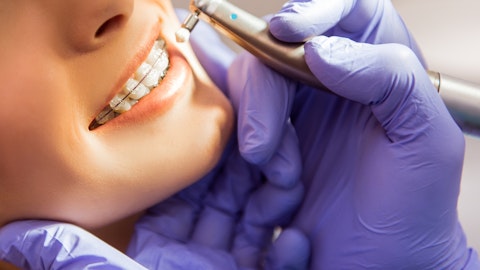Secondly, the situation in China regarding tourism around the world, as you followed our business on Filorga, it really went with Chinese travel, and as Chinese travel opens up potentially in the back half, we will see an improvement. But we assumed in the impairment that, that will continue to be a headwind for us as we move through at least the first six months of the year, slightly improving as we move through the back half of the year. And then as you well can understand the significant rise in interest rates has lowered the value in our discounted cash flow. But let me step back for a moment. Again, we continue to be very confident in our strategy around skin health. Obviously, the short-term impacts that we have had related to China, we believe ultimately, we will get behind us, but we have obviously been conservative in our assumptions on Filorga.
We went into 2022, assuming China would open up and it didn’t. But we feel good about where we are. We have seen some early signs, certainly in the early part of the year, particularly across our European business on Filorga to give us quite a bit of encouragement. Our U.S. business continues to be very, very strong, despite the inventory pullback that we saw in the fourth quarter. If I take our online business specifically, our share growth was up 300 basis points online in the back half of last year and on the year, which is terrific. Obviously, we incurred that share growth despite, obviously, inventories getting reduced. We do expect some of those inventories to come back slightly, but we are obviously assuming a considerable amount of conservatism there because we can’t be sure that particularly the online retailers will take inventory up as quickly as they took it down.
Our business overall continues to grow very, very nicely, particularly in the professional channel, which is the core part of our PCA and Elta business, and we have a good innovation plan coming on stream for 2023. So, overall, we still feel very good about the strategy behind skin health. Need China to turn and you have heard a lot of discussions about the uncertainty in China, but we think we have positioned the brand. So, obviously, as China comes back, we will be in a position to reap the benefits of that.
John Faucher: The only thing I’d add on, Filorga, is if you go back and look at the timing of when we purchased it late 2019, it’s built off of very strong growth in China at the time and very strong growth in the travel retail, and then obviously, the pandemic hit, nobody had insight to that. The underlying brand is really strong. There’s going to be new innovation. We have got the advertising to support it to bring it to market. We are still confident in the long-term success of this brand. So that’s what I’d add on Filorga.
Noel Wallace: Kevin, the only thing I would say relative to M&A strategy and capital deployment is our preference is still to deploy capital internally to our projects, because we are a big believer in return on invested capital and that generates the highest incremental returns. And so if you look at the investment we are making at Hill’s and capacity, if you look at the investment we are making on some of our sustainability projects, Red Collar honestly is a little bit of both, right? It’s M&A, but it also is an investment in internal growth, because we think that Hill’s is one of the best growth engines we have. So I don’t think there’s any change in our capital allocation strategy, invest internally, we would like to pay a healthy dividend and the Board helps us develop the dividend strategy longer term.
Then we will look at projects when the valuations are appropriate and we will see what happens with valuations in the market right now. I think the market is still somewhat influx from that standpoint.





